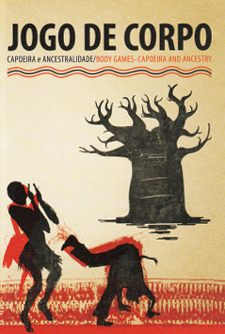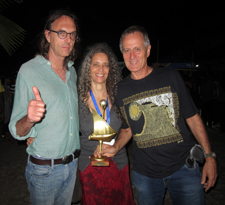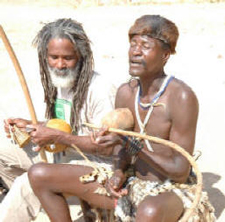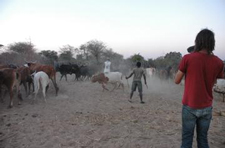The Angolan Roots of Capoeira

The documentary film Body Games, Capoeira and Ancestry (2014) is one of
the major outcomes of the research project.
The project The Angolan Roots of Capoeira: Transatlantic Links of a
Globalised Performing Art explored the transatlantic links between the
Afro-Brazilian martial art capoeira and combat games in Southern Angola.
An extended period of civil war made it difficult to carry out fieldwork
in the interior of Angola until 2003. The research aims both to fill a significant gap in scholarship and disseminate its outcomes to the wider public through a documentary and publications.
The project was funded by the
Arts and Humanities Research Council (AHRC) from 2010 to 2013, with
additional funding for the documentary's postproduction raised through a
successful
indiegogo crowd funding campaign.
Body Games - Capoeira and Ancestry
The documentary Body Games - Capoeira and Ancestry is one of the
major outcomes of the research project and was completed in November 2013.
It has been shown at many documentary film festivals in Africa, Europe, and the Americas throughout 2014 and 2015.
The film is co-directed by Richard Pakleppa,
Professor Matthias Röhrig Assunção and capoeira master
Cobra Mansa, and follows Cobra Mansa and the team on travels through Angola and
Brazil in search of the historical roots of his art. The journey explores
deeper connections between slavery, identity and society.

Members of Body Games' production team celebrate winning the Ousmane Sembene Development Film Award at the
Zanzibar International Film Festival.
Buy DVD
You can now order Body Games - Capoeira and Ancestry on DVD for £15 plus postage through our University web shop:
For further information please contact Belinda Waterman.
Trailer
Watch the trailer on YouTube:
Film festival awards
Body Games - Capoeira and Ancestry held its
premiere at Zanzibar International Film Festival in June 2014. The film won the following awards:
- Ousmane Sembene Development Film Award, Zanzibar International Film Festival, June 2014.
- Leigh Whipper Award for Best Feature Documentary Film, Philadelphia International Film Festival & Market, 2014
- Best Editing of a Documentary, Portsmouth International Film Festival, 2014
- Intangible Culture Film Prize, 14th RAI International Festival of Ethnographic Film, Bristol, June 2015
- Best Foreign Documentary, VII Luanda International Film Festival (FIC-Luanda), November 2015
- Public History Prize (Film Category), Royal Historical Society, London, November 2015
More about the project
-
Capoeira and Angola

Dialogue of musical bows: Capoeira Mestre Cobra Mansa from Brasil with
the berimbau and an Angolan mbulumbumba player Balthazar Tchakota, August
2010.
Capoeira
During the nineteenth century African and Creole slaves living in port
cities and surrounding plantations in Brazil developed a combat game called
capoeira. Even though initially repressed by the authorities, it spread to
the free lower classes during the nineteenth century, and to the rest of
Brazil during the twentieth century. Capoeira has become one of the
most-well known aspects of Brazilian culture and is now widely practiced by
hundreds of thousands of people in every continent.
Capoeira consists of a combination of acrobatics, rhythms, combat, dance and
theatrical performance, all of which maintain a distinctive Afro-Brazilian
character. Just how many of its characteristics are 'African' is the object
of much debate among capoeira practitioners, academics researching its
history, and the wider public interested in the culture of the 'Black
Atlantic' or engaged with diasporic issues.
Angola
Our research explores several traditions in south-western Angola, a region
often identified as providing the 'roots' of capoeira because of the
existence of instruments and movements similar to capoeira. There are
several combat games which use alternatively kicks, hands, sticks and other
weapons, techniques that are also present in historical capoeira styles. The
project explores the music and lyrics that accompany these performances, and
related dances and rituals practiced in some villages belonging to different
ethnic groups of the Nyaneka family in that region.

Filmmaker Richard Pakleppa captures daily life in the rural area of
Cunene, Angola, August 2010.
Project research
The Arts and Humanities Research Council (AHRC) funded the project from June
2010 to December 2013. During this period, two fieldwork trips to Angola and
one to Brazil were completed by the interdisciplinary team consisting of a
historian, an ethnomusicologist, a distinguished Capoeira teacher and a
renowned filmmaker. The collected data contributed to the making of the
documentary and provides the basis for further scholarly analysis.
Ethnographic fieldwork is complemented by a specialist historian who worked
in archives in Angola and Portugal.
The project aims to assess the extent of continuities, and borrowing, but
also of ruptures, changes and re-inventions in order to understand the
'creolization' process through which some specific African traditions merged
and developed into something new, original and global. Moreover, the project
has employed fieldwork methods which involve people in a transcultural
dialogue. For instance, performers in Angola have reacted in uniquely
illuminating ways when faced with instruments, movements and music that are
linked to their own traditions.
-
People
Professor Matthias Röhrig Assunção, Principal Investigator
Dr Mariana P Candido, Co-investigator
Dr Mariana P Candido
is specialized in the history of Angola from the seventeenth to the
nineteenth centuries. Her current research examines the social and political
effects of the transatlantic slave trade in Benguela and its hinterland.
More broadly her interests include the history of slavery, forced migration
and slave trade, the South Atlantic world, and the African diaspora. She is
the author of Fronteras de Esclavización: Esclavitud, Comercio e
Identidad en Benguela, 1780-1850 (Colegio de Mexico Press, 2011),
An African Slaving Port and the Atlantic World. Benguela and its Hinterland
(Cambridge University Press, 2013) and the co-author of Crossing Memories:
Slavery and African Diaspora with Ana Lucia Araújo and Paul Lovejoy
(Africa World Press, 2011). She is an Assistant Professor at the Department
of History at the University of Kansas.
Dr Christine Dettmann, Senior Research Officer
Dr Christine Dettmann was the Senior Research Officer of the project
until 2013. She now holds a chair in Ethnomusicology at the Hochschule für
Musik und Theater München in Germany and continues to be a visiting fellow
at the History Department of the University of Essex.
Cobra Mansa, Capoeira Consultant
The renowned capoeira mestre (master) Cobra Mansa (Cinésio Feliciano
Peçanha, graduated mestre in 1984) has been performing and teaching capoeira
for the last thirty years. He is the founder and president (1994-2004) of
the International Capoeira Angola Foundation, an NGO based in Washington,
DC, with a dozen affiliated groups in Brazil, the US, and Europe. Mestre
Cobra Mansa holds a degree in physical education and has researched
movements, music, lyrics and instruments of capoeira for many years. He is a
well-known and highly-respected teacher of capoeira across the world and has
given many workshops and talks in the US, Western Europe, Russia, Japan, and
Latin America. He worked as a consultant for Mandinga in Manhattan
(2005), a documentary about the globalisation of capoeira, and has performed
as a leading musician on Audio-CDs of capoeira music. He also links
permaculture to Capoeira Angola in his communal project Permangola
in Bahia, Brazil.
Richard Pakleppa, Filmmaker
Richard Pakleppa is an independent filmmaker. He was awarded a Degree in
African Studies, University of Cape Town for a thesis on performance
culture, political struggle and identity in the townships of Cape Town,
1983-86. Since 1990 he has made films incorporating oral history and
storytelling in Namibia, South Africa and Angola. The documentary
Angola, saudades from the one who loves you (2005) won best documentary
award at the Three Continents Film Festival; at the Durban International
film festival and at the Munich Documentary Film Festival. Land, Fire
and Water (2009) gives voice to the San communities in southern Angola.
-
Academic publications
Dr Mariana Candido
Project co-investigator, Dr Mariana Candido (University of Kansas) has
published various articles and books about the history of the slave trade,
focusing on the relationship between the Angolan port Benguela and Brazilian
ports. With the financial support of this project, her fieldwork and
research has led her to Portugal and Angola too.
Her recent publications include:
- 'Slave Trade and New Identities in Benguela, c. 1700-1860’,
Portuguese Studies Review', 19, 1-2 (2011), pp. 43-59.
- 'Dona Aguida Gonçalves marchange à Benguela à la fin du XVIII
siécle', Brésil(s).Sciences humaines et sociales, 1 (2012), pp.
33-54.
- 'Marriage, Concubinage, and Slavery in Benguela, ca.1750-1850', in
Slavery and Africa and the Caribbean: A History of Enslavement and
Identity since the 18th century, eds. Nadine Hunt and Olatunji Ojo
(London, New York, I.B. Tauris, 2012).
- An African Slaving Port on the Atlantic World: Benguela and its
Hinterland, (New York, Cambridge University Press, 2013)
Professor Matthias Röhrig Assunção
- 'Stanzas and Sticks: Poetic and Physical Challenges in the
Afro-Brazilian Culture of the Paraíba Valley, Rio de Janeiro”. History
Workshop Journal, 77 (April, 2014). Advance Access available at
History
Workshop Journal
- 'Capoeira, art créole.' Cultures-Kairós – Revue d’anthropologie
des pratiques corporelles et des arts vivants, Dossier “Capoeiras.
Objets-sujets de la contemporanéité”. Maison de Sciences de l’Homme,
Paris Nord, 2012. ISSN: 2261-0758
Read 'Capoeira, art créole' on Cultures-Kairós
- 'Capoeira, arte crioula'. Cultures-Kairós – Revue
d’anthropologie des pratiques corporelles et des arts vivants,
Dossier “Capoeiras. Objets-sujets de la contemporanéité”. Maison de
Sciences de l’Homme,Paris Nord, 2012.
Read 'Capoeira, arte crioula' on Cultures-Kairós
-
'History and Memory in Capoeira Lyrics from Bahi, Brazil', (.pdf),
in N Priscilla Naro, R Sansi-Rosa and DH Treece (eds), (New Yor:
Palgrave, 2007), Cultures of the Lusophone Black Atlantic, 199-218.
-
More publications by Dr Matthias Röhrig Assunção
-
News and media
Media
- Jogo de Corpo. Capoeira e Ancestralidade / Body Games. Capoeira
and Ancestry. Documentary Film, 87 mins. Nyaneka/Portuguese,
Portuguese and English subtitles. The DVD is now available for sale.
Press releases and interviews
Related project websites
Related projects
Our academic staff
Our academic staff are internationally recognised for their expertise across a range of areas in history. Find out more about their research
interests by reading their staff profiles.
Watch our videos
Watch a taster lecture, hear our students’ opinions of their study experience and see our staff talking about their latest research. Our
videos will show you the passion and enthusiasm that we offer.
Postgraduate study
We are a leading centre for history postgraduate study at both Masters and PhD level. Become part of our active research
community and benefit from the expert teaching and supervision of our academic staff.
AHRC funding
Apply for a PhD studentship for your doctoral study funded by the
Consortium for Humanities and the Arts South-East England (CHASE) and the Arts and Humanities Research Council (AHRC).